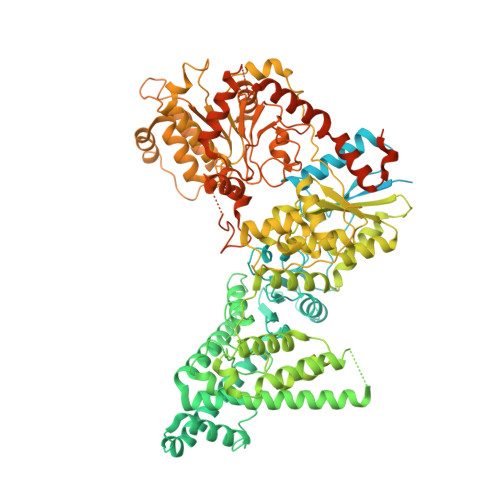A Legionella toxin exhibits tRNA mimicry and glycosyl transferase activity to target the translation machinery and trigger a ribotoxic stress response.
Subramanian, A., Wang, L., Moss, T., Voorhies, M., Sangwan, S., Stevenson, E., Pulido, E.H., Kwok, S., Chalkley, R.J., Li, K.H., Krogan, N.J., Swaney, D.L., Burlingame, A.L., Floor, S.N., Sil, A., Walter, P., Mukherjee, S.(2023) Nat Cell Biol 25: 1600-1615
- PubMed: 37857833
- DOI: https://doi.org/10.1038/s41556-023-01248-z
- Primary Citation of Related Structures:
8JHU - PubMed Abstract:
A widespread strategy employed by pathogens to establish infection is to inhibit host-cell protein synthesis. Legionella pneumophila, an intracellular bacterial pathogen and the causative organism of Legionnaires' disease, secretes a subset of protein effectors into host cells that inhibit translation elongation. Mechanistic insights into how the bacterium targets translation elongation remain poorly defined. We report here that the Legionella effector SidI functions in an unprecedented way as a transfer-RNA mimic that directly binds to and glycosylates the ribosome. The 3.1 Å cryo-electron microscopy structure of SidI reveals an N-terminal domain with an 'inverted L' shape and surface-charge distribution characteristic of tRNA mimicry, and a C-terminal domain that adopts a glycosyl transferase fold that licenses SidI to utilize GDP-mannose as a sugar precursor. This coupling of tRNA mimicry and enzymatic action endows SidI with the ability to block protein synthesis with a potency comparable to ricin, one of the most powerful toxins known. In Legionella-infected cells, the translational pausing activated by SidI elicits a stress response signature mimicking the ribotoxic stress response, which is activated by elongation inhibitors that induce ribosome collisions. SidI-mediated effects on the ribosome activate the stress kinases ZAKα and p38, which in turn drive an accumulation of the protein activating transcription factor 3 (ATF3). Intriguingly, ATF3 escapes the translation block imposed by SidI, translocates to the nucleus and orchestrates the transcription of stress-inducible genes that promote cell death, revealing a major role for ATF3 in the response to collided ribosome stress. Together, our findings elucidate a novel mechanism by which a pathogenic bacterium employs tRNA mimicry to hijack a ribosome-to-nuclear signalling pathway that regulates cell fate.
- G.W. Hooper Foundation, University of California at San Francisco, San Francisco, CA, USA.
Organizational Affiliation:
















